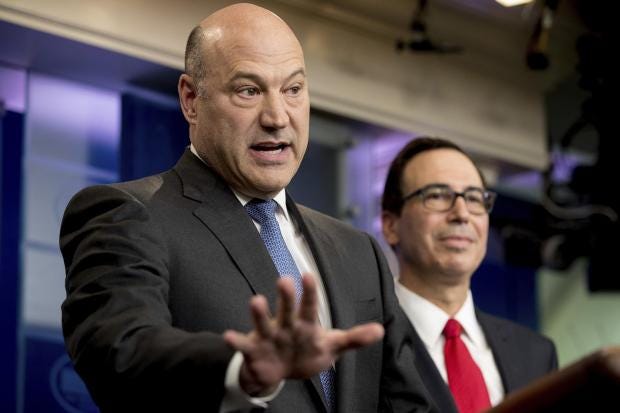
National Economic Director Gary Cohn, left, accompanied by Treasury Secretary Steve Mnuchin, speaks in the briefing room of the White House AP
The administration of President Donald Trump is pushing for a vote to overhaul US healthcare law this week – with White House officials saying they are confident legislation will be successfully pushed through soon.
In one of a number of television interviews by officials seemingly aimed at ramping up the pressure to get the legislation onto the floor of the House of Representatives, White House economic advisor Gary Cohn told CBS News that the administration “were convinced” that they have enough votes in the House of Representatives to pass the bill.
“I think it will happen this week,” White House Chief of Staff Reince Priebus told the same network, in the wake of a tweet from Mr Trump that said the new bill was “on its way”.
Republicans have had difficulty gathering support for the new legislation – despite the party controlling both sides of Congress. While maintaining some parts of Obamacare, the American Health Care Act (ACHA) gets rid of the insurance mandate and changes the size and recipients of subsidies. By 2026, the AHCA would increase the number of uninsured people by 24 million, the Congressional Budget Office reported in its analysis of the last version of the bill in March.
That version failed to gather enough potential votes in the House, partially as a result of strong opposition from the House Freedom Caucus Republican group. The caucus demanded that the new law repeal more of Obamacare’s insurance mandates to truly lower premiums.
The group of roughly three dozen conservative hardliners said they would endorse the revised version of the healthcare bill last week, following the introduction of the MacArthur Amendment, which would allow states to opt out of certain Obamacare requirements.
With at least an additional 30 guaranteed ‘yes’ votes on the bill, the fate of the repeal likely lies in the hands of moderate Republicans, many of whom have not supported the legislation because of its deep cuts to the Medicaid programme and the number of people that could be left uninsured.
For example, states could allow health insurers to charge people with pre-existing conditions higher premiums – rather than the current provisions which mean sick and healthy people are charged the same rates – if those jurisdictions have an alternative way to provide or subsidise coverage for people with serious illnesses.
“We are having those member-to-member conversations right now,” Cathy McMorris Rodgers, chair of the House Republican conference, said on Fox News.
Ms McMorris Rodgers said Republican members needed time to understand new tweaks to the bill. She declined to elaborate on how close leaders were to having enough support to pass the legislation, saying: “We’re very close.”
Mr Trump has tried to make clear that pre-existing condition provisions will not be reduced, telling Bloomberg News on Monday that the new healthcare plan “will be every bit as good on pre-existing conditions as Obamacare”. That followed up a tweet he sent over the weekend which said the “revised healthcare plan will have much lower premiums & deductibles while at the same time taking care of pre-existing conditions!”
Later on Monday, White House Press Secretary Sean Spicer appeared to try and damp down expectations, saying “We’re not there yet,” but added that the Trump administration is “getting closer and closer every day”. The office of House Speaker Paul Ryan said that no vote was scheduled as of Monday and that a it would be scheduled “when we have the needed votes”.
Certainly some moderates believe those votes are not yet secured. Representative Charlie Dent, a moderate Republican from Pennsylvania, said he still had problems with the latest plan and suspected there were not enough votes to pass it.
“Too many Americans are going to be without coverage,” Mr Dent told MSNBC, adding that the plan could make things even worse for vulnerable Americans.
Although Jim Jordan, a member of the House Freedom Caucus is more confident. “This bill doesn’t get all the way there but it’s a good step,” he told CNN. “[It is] the best we can get out of the House right now”.
[“Source-independent”]











